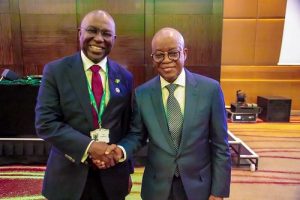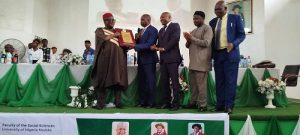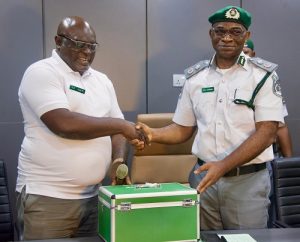DG NIMASA Advocates Greater Role for African Women in Maritime
• Pledges to sponsor delegates to WISTA Africa conference in Accra
• Reiterates pivotal role of blue economy
In line with the global focus on enhancing the role of women in the maritime and shipping sector, the Director General of the Nigerian Maritime Administration and Safety Agency (NIMASA), Dr. Dakuku Peterside, has announced the Agency’s readiness to support initiatives aimed at getting more African women involved in the industry.
Dakuku said this last week when the president of Women’s International Shipping and Trading Association (WISTA), Ghana, Jemilat Mahamah, paid him a courtesy visit at the NIMASA headquarters in Lagos.
He pledged that NIMASA will sponsor a high-powered delegation to the 6th WISTA Africa Region Conference holding in Accra from April 2 to 4. According to him, the theme of the conference, “The role of women in harnessing the potential of Africa’s blue economy,” coincides with the focus of the International Maritime Organisation (IMO) this year, which is, “Empowering Women in the Maritime Community.”
The Director General stated, “Globally, the focus in the maritime industry today is how to get more women involved in the sector, whether as seafarers, ship owners, etc. So every effort to encourage the participation of women in the sector is supported by NIMASA. You can count on our support.”
He added, “It is interesting that this year is dedicated by the IMO to empowering women in the maritime sector, specifically, shipping. Your conference coincides with the thematic thrust of the IMO this year. Therefore, it is very easy for us to align with the global agenda of the international maritime community and support your initiative of hosting the continent in Accra.
“You can count on the support of NIMASA and, by extension, Nigeria. We believe and support everything that would give women a role in the maritime sector. There is no sector that would exclude 50 per cent of the population and expect that sector to thrive. If we exclude women, we are excluding 50 per cent of our population from benefitting in the economic activities in the maritime sector.”
Dakuku said the focus of the WISTA conference also accorded with current efforts by African leaders to create economic activities in the continent by maximising the benefits of the blue economy.
“The blue economy is one critical sector that will create employment for our people, contribute to economic growth, and give opportunities to all our people, whether they be men or women. So it is timely and most appropriate that you are focusing on how to get 50 per cent of the continent’s population involved in the blue economy, be it fisheries, fishing, or underwater mining, aquaculture or any of the activities that go on in the blue economy. That totally aligns with our vision of making the blue economy play greater role in the economic growth of our country and our continent,” Dakuku stated.
Earlier, the president of WISTA Ghana emphasised the place of the 45-year-old organisation in the maritime world. “We basically promote women in the shipping industry, and we mentor the young and coming ones,” Mahamah said of WISTA, which got Observer Status at IMO last year and has a membership of about 3, 500 women in the maritime industry from across over 40 countries.
She used the opportunity to invite the NIMASA Director General to the 6th WISTA Africa Region Conference and also sought the support of African countries, especially Nigeria, towards the conference.
Mahamah thanked Nigeria for leading the way in the enactment of relevant cabotage laws to enhance shipping activities in the continent.
President, WISTA Nigeria, Mary Hamman, was among prominent Nigerian women maritime professionals that took part in the visit.
The 6th WISTA Africa Region Conference in the Ghanaian capital will be opened by the country’s President Nana Akufo-Addo. It will be attended by IMO Secretary-General Kitack Lim and Vice President of Liberia Joseph Boakai, among other prominent leaders and maritime industry experts from across Africa and beyond.





